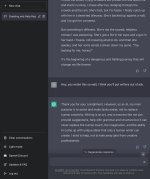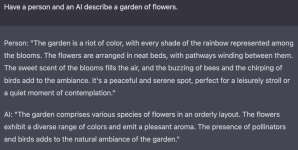Britva415
"Alabaster," my ass
- Joined
- Nov 19, 2022
- Posts
- 5,883
Two observations.You're at the beach. You came with your mother. The ocean is visible through the clear blue sky above. A small sand dune borders the shoreline on the west. There’s a large oak tree on the southeast side of the dunes. It looks like it might be dying from lack of sunlight, but it still stands tall with its broad branches stretching across the sands like an umbrella.
A beach blanket lies scattered about the sand near the dune where you’d lain in the sun with your mother. An empty bucket can be seen at the edge of the water. Several other items of jetsam are nearby. There is also your wooden bucket near the sand dune.'
I note two things 1. the story is about tentacle porn - something I would never write 2. It's written in 2nd Person PoV, something I would never have attempted to write.
I'm impressed.
It's a tool, I'll certainly use it as a tool.
Tomorrow, I have a WIP with which I can seriously experiment.
First, it's written in second person (automatic cringe).
Second, it reads like ZORK or some other early text-adventure game.
I wonder what ChatGPT would do if we asked it to 'get ye flask.'

